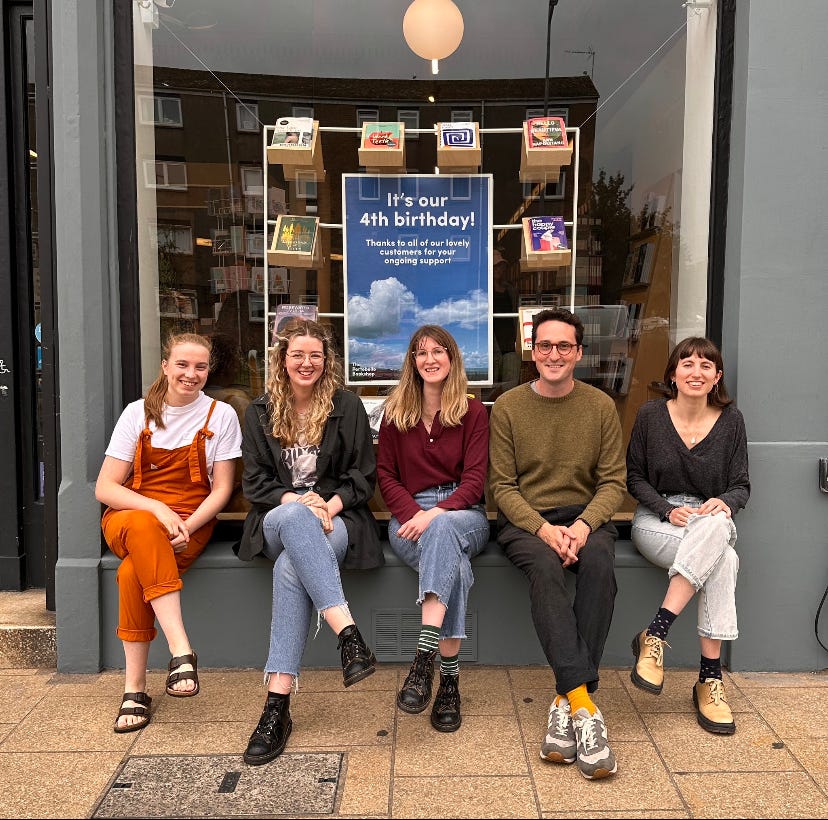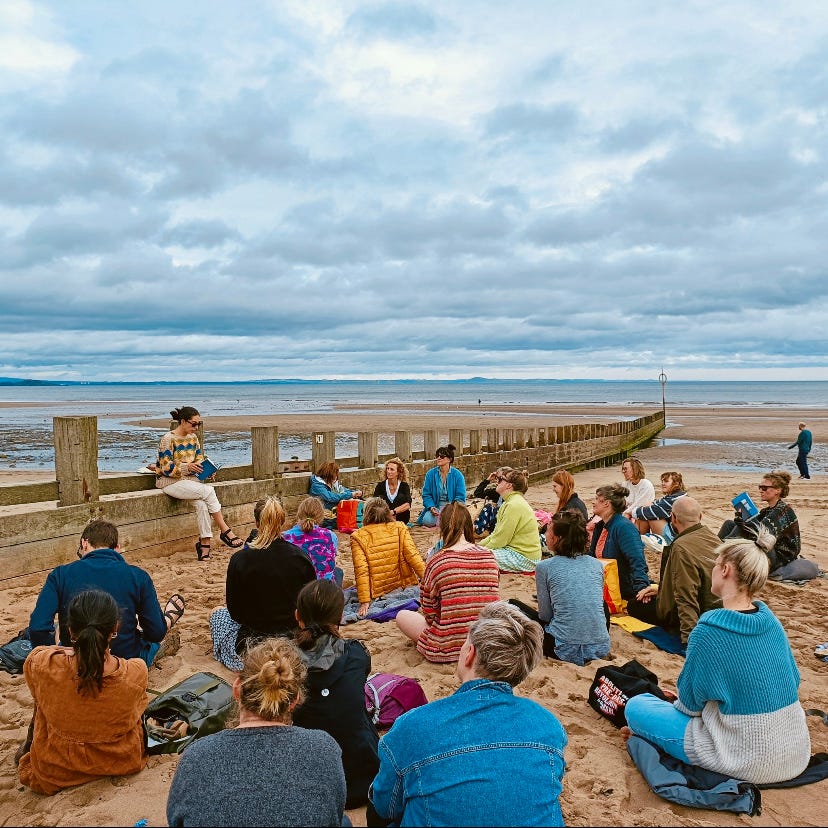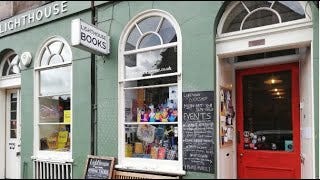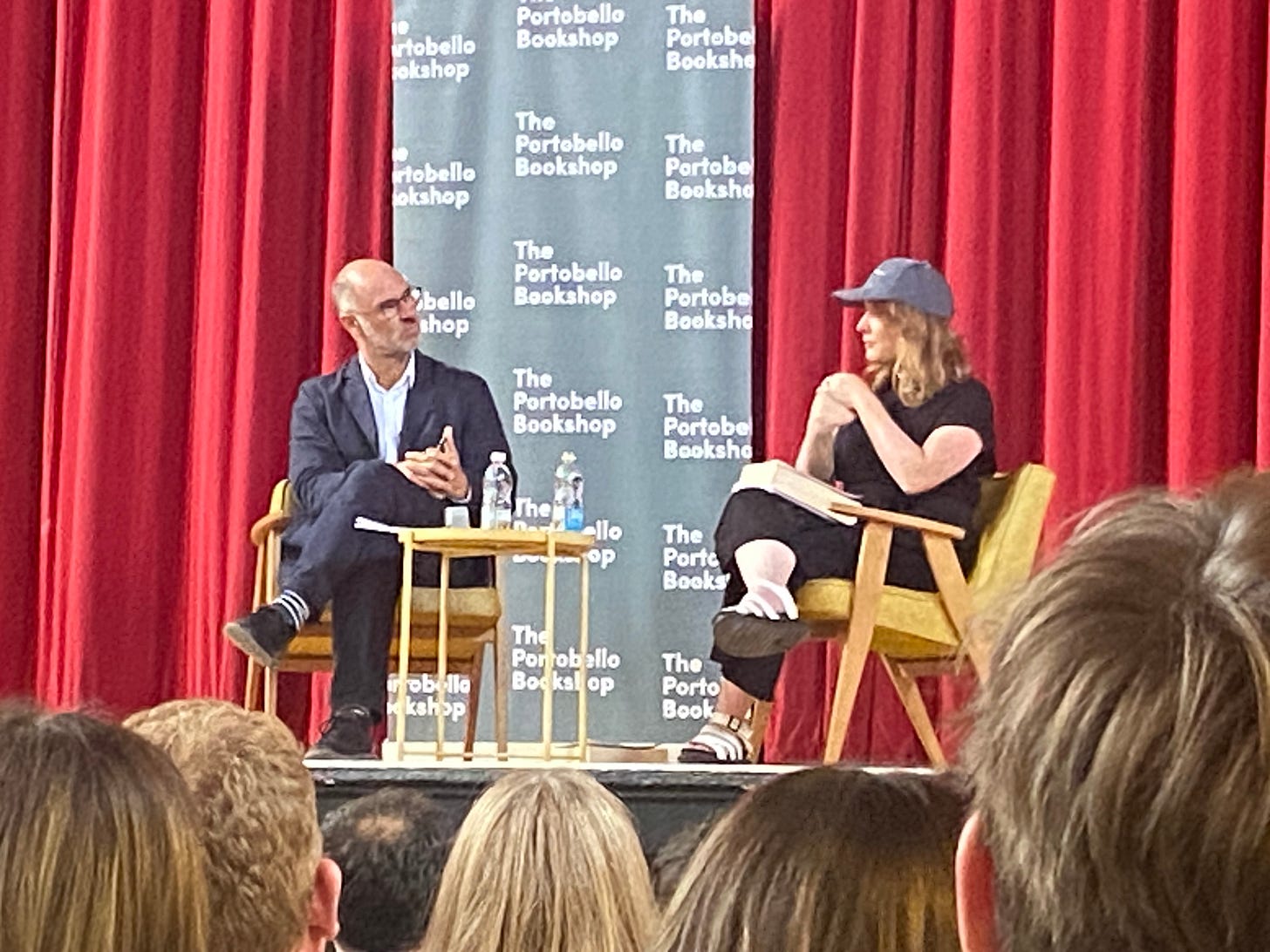Many ways to fall in love in a bookshop
We celebrate writing and Edinburgh's incredible independent book scene as one city store is crowned the best in Britain
When Borders at Fort Kinnaird closed in 2009, I suddenly felt bereft - and outraged. I no longer had a bookshop within walking distance, which felt like the loss of a fundamental human right.
True, I had access to Amazon, but there was nowhere for my children to browse picture books while I picked up the latest crime thriller or Booker prizewinner.
I took action, contacting an existing independent bookstore who I knew were looking to expand and put in a plea for them to open in my area, Portobello. When they declined, I toyed with the idea of opening a bookshop myself but didn’t get further than downloading a Guide To Opening Your Own Bookshop (reader, I didn’t even get round to reading it).
So imagine my delight when in 2019 Jack Clark opened the Portobello Bookshop. Brand new books within easy walking distance! A chance to be in the company of fellow readers and book lovers!
Of course, with any story that begins ‘They opened in 2019…’ we all know what’s coming, but nimble ideas such as making local deliveries throughout lockdowns helped the bookshop survive.
It’s now a thriving part of the local community, staging events with authors ranging from literary stars such as Zadie Smith and Barbara Kingsolver to writers with local connections such as Michael Pedersen and V.E. Schwab.
Recently the bookshop has received what must be the ultimate 21st century accolade – it’s been crowned the UK and Ireland’s Indie Bookshop of the Year in the first TikTok Book Awards.
Of course, Portobello is not alone in boasting its own independent bookshop. Even as High Street chains struggle and Waterstone closes its East End branch, indies have sprung up across the city - Edinburgh now boasts at least eleven independent bookstores selling new books.
So, how are our indie bookstores bucking the trend? The Portobello Bookshop’s owner Jack is clear about the reason behind their success.
“On the day we opened we had a queue of local Portobello residents outside our doors, all of whom subsequently became friends and regular customers.”
The local community has taken the store to its heart - in a very real way for one customer, for whom the bookshop was the ideal location for the ultimate romantic gesture.
When customer Cat wanted to pop the question to her partner, staff helped her plant a book containing the marriage proposal. “It was one of the loveliest things that’s ever happened at the shop,” says Jack, who watched in delight as Cat’s partner discovered the book and accepted her proposal.
It’s this sense of community that has cemented the shop’s success. As well as connecting with individuals, the bookshop has partnered with local projects such as Art Walk Porty and the Portobello Book Festival, tapped into community interests such as wild swimming by running themed events, and set up initiatives including the chance to donate to local school libraries.
“We’re proud to be a central community hub,” says Jack. “Bookshops bring people together and are a magical ‘third place’ to visit outside of work and home, meet with friends, chat to other book lovers and booksellers and discover new reads.”
It’s this sense of connection that Lighthouse, in Nicolson Street, billed as ‘Edinburgh’s Radical Bookshop’, seeks to facilitate. Owner Mairi Oliver explains: “Books offer a way to show readers they’re not alone in the world because they can see themselves on the page.”
For Lighthouse, community is about creating a network for people who might otherwise feel negle cted, marginalised or even targeted by wider society. It’s about connecting people who want to draw support from others like them and give support in their turn.
Mairi explains: “When you feel you’re being attacked in the media, for example if you’re a young trans person or a trade unionist, it can be galvanising to come to an event where there are 50 other people who all care as passionately as you. It strengthens your ability to go on.”
The Lighthouse community is built by customers who will travel from Glasgow and Aberdeen because they know the shop will stock the titles they’re interested in.
“Curation is a key thing for us,” Mairi says. By not stocking the titles you can easily find in a large chain bookstore or online, space is freed up for other authors, other subjects. “We’re making space for others and giving them room to breathe.”
In this respect, independent bookshops are like the TARDIS: they hold so much more than you’d expect from their floor space.
It’s a point reiterated by Mike Calder of Transreal Fiction on Candlemaker Row. In business since 1997, Transreal specialises in fantasy and science fiction, as well as related art books and European graphic novels.
Mike agrees that one advantage of not having to stock multiple copies of the Sunday Times Bestseller list is that shelf space is freed up. He stocks fewer copies of more titles, so the choice feels greater than in a chain bookstore.
It means Mike can focus on what he knows his customers want to read, rather than what he hopes will appeal to the broadest audience. “I know my customers,” he says. “I first met some of them when I worked in a bookshop as a student – now we’re all getting on a bit!”
Perhaps unusually, Mike doesn’t look to build a community through events and book signings. “I know the level of work involved, and I decided that, as it’s just me involved in the business, it wasn’t something I wanted to devote the necessary time and energy to.”
It’s a markedly different approach to Edinburgh’s other independent bookshops, but Mike has managed to foster a highly personal connection with his customers that ensures they stay loyal.
These customers aren’t confined to Edinburgh or even Scotland. One American booklover was so grateful for Mike’s help in tracking down a copy of a book he loved as a child that he praised Mike as being “as much a wizard in my life as any I’ve read about.”
That sense of connection with someone who gets you because they share your passions is another way of building a community. This doesn’t mean the community remains fixed or closed to new members.
Recently, Mike’s loyal customers have been joined by a new crowd: the Tik Tok generation.
“When a book gets popular on Tik Tok there’ll be a sudden spike of interest,” Mike explains. “They’ll often come in a group, and they’ll come in for one book but pick up others.”
Youngsters who might just be chumming their friends on a trip to a bookstore suddenly discover something for themselves – and a new reader, customer, and member of the sci-fi/fantasy community is born.
Their interests will feed Mike’s buying choices, and his range of stock will fuel their curiosity.
Talking to Mike, Mairi and Jack, it’s clear that there’s more than one way to build a community – and more than one community to foster.
It could be a community based on a location, a shared identity or interest, or love of a particular genre - and these communities needn’t be mutually exclusive. Mairi points out that “Edinburgh has that nice thing that the independent bookshops aren’t necessarily competitive. Readers will seek out different things in different shops.”
So whatever community you feel you belong to - whether that’s based on where you live, how you identify, what your interests are or what genre of fiction you love to read – get along to an independent bookshop.
Ultimately, they’re all forging and fostering one community - a community of readers. Best support them as much as we can; we miss them when they’re gone.
Jo Spencely is an Edinburgh-based screenwriter and playwright.
An A to Z (well, A to T) Guide to Edinburgh’s independent book shops
Argonaut Books A community bookshop staging regular themed book club nights covering queer, fiction, horror, crime and ‘wildcard’ reading. 15-17 Leith Walk
Blackwell’s The original and to many still the best. The academics’ book shop. 53-62 South Bridge
The Edinburgh Bookshop Founded in 2007 and crowned Scotland’s Independent Bookshop of the Year at last year’s Bookseller Industry Awards. ‘Heavily powered by tea, biscuits, high fives and dog cuddles’. 219 Bruntsfield Place
Ginger and Pickles Cosy and quaint children’s bookshop with a carefully curated selection for everyone from babies to young adults. 51 St Stephen Street, Stockbridge
Golden Hare Books A bookshop to warm your heart and hands by its wood-burning stove. Named Independent Bookshop of the Year for the UK & Ireland at the 2019 British Book Awards. 68 St Stephen Street, Stockbridge
Lighthouse Edinburgh’s radical bookshop is queer-owned and women-led with a range including politics, feminism, LGBT+ writing and environmentalism. 43-45 Nicolson Street, Newington
The Portobello Bookshop Voted Independent Bookshop of the Year for the UK & Ireland by the phenomena that is The TikTok Book Club. 46 Portobello High Street
Rare Birds Books Scotland’s only bookshop devoted to women’s writing with a popular subscription book club. 13 Raeburn Place, Stockbridge.
Topping and Co The biggest independent to open in living memory. A haven for book lovers in the city centre. 2 Blenheim Place
Transreal Fiction Hard to find sci-fi, fantasy, graphic novels and beautiful art books since 1997. 46 Candlemaker Row
Typewronger Books Bookshop, riso print studio, small press publisher and event space in a beautiful basement at ‘the top of the Walk’. 4a Haddington Place
The secrets of Succession
Succession creator Jessie Armstrong gave fans an insight into the making of the hit HBO series in a sold-out event staged by Portobello Bookshop.
In one of the first events to be staged at the newly re-opened - and now community-owned - Portobello Town Hall, perhaps the most celebrated British screenwriter of his generation talked about the workings of ‘the writers room’ and collaborating with the series stars including Brian Cox.
One of Succession’s most famous lines - so famous you can now buy baseball caps emblazoned with ‘You’re my number one boy’ - was most likely improvised by Cox, Armstrong told the audience, as it wasn’t in the original script.
Succession was written by a US-style team of about eight or nine writers who would lock themselves in a room in London - for one series their base was Brixton - to write about the exploits of the super-rich Roy family living and deal-making in New York.
Spoiler alert. Armstrong told the hundreds of fans who heard him interviewed on stage by novelist Kirstin Innes - wearing a ‘You’re my number one boy’ cap - about resolving the series ultimate question, who would succeed the show’s patriarch, media magnate Logan Roy.
“I always knew that (the show) was about mortality, that there would be a sad ending. It was always going to finish with a sense of futility for the people who had been making all these great deals,” he said.
“From the second series I started to think that it might be Tom. He works hard and makes himself amenable to power and those are the kind of people who climb the ladder.”
Earlier in the day, Armstrong, who is also the co-creator of The Thick of It, Peep Show and Fresh Meat, told an Edinburgh TV Festival event how the original script he wrote which eventually became Succession had been explicitly about the Murdoch family and their media empire.
INQUIRER EXTRA ON WRITERS
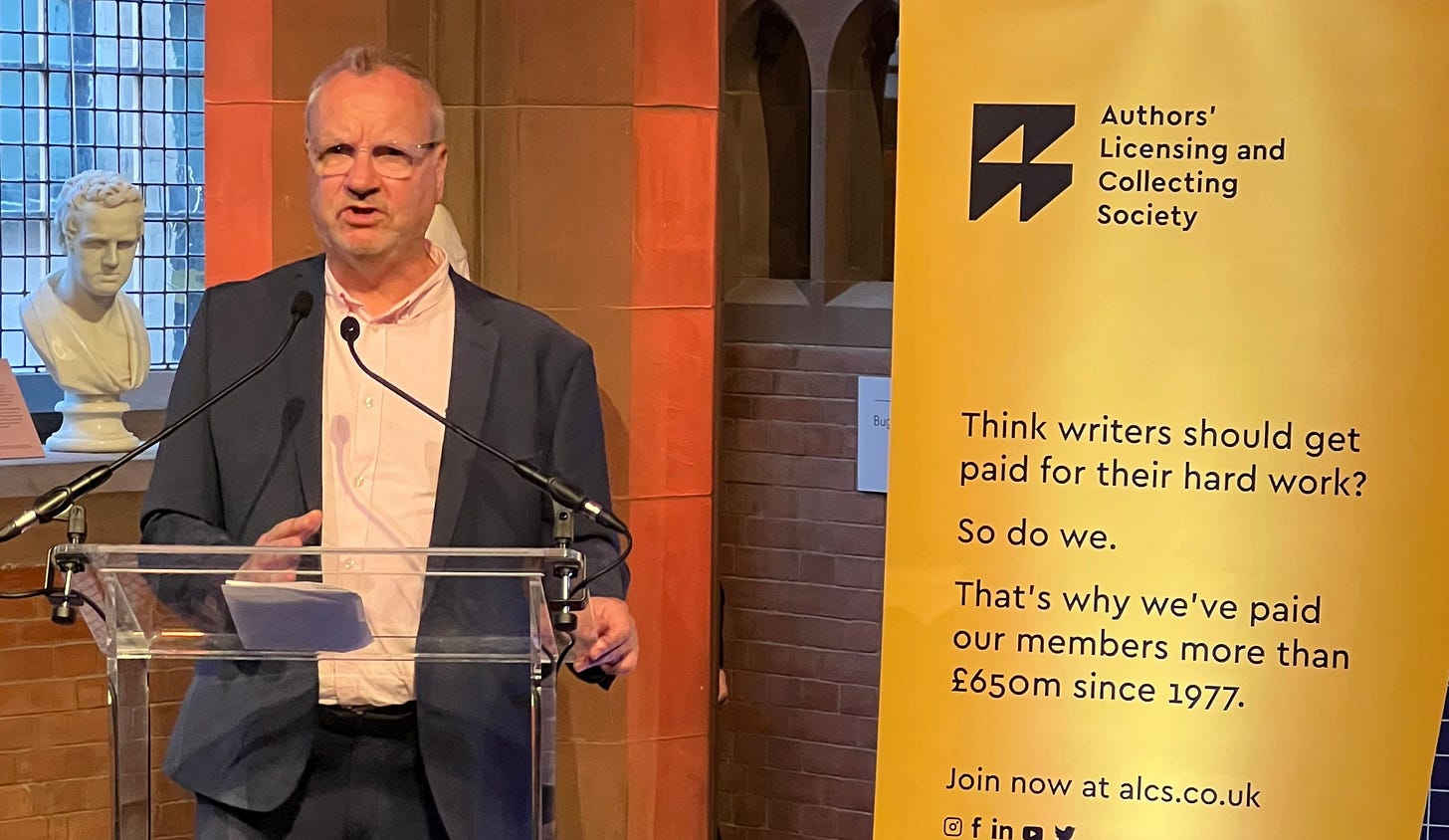
Wishart calls for action on AI to protect writers
As the Festival reaches the crescendo of its final weekend, Pete Wishart, former Runrig keyboard player and Vice Chairman of the All-Party Parliamentary Group on Writing, told a gathering of writers that their profession is the bedrock of the festivals’ artistic success – while more must be done to control the advance of Artificial Intelligence (AI), writes Kenny Kemp.
“Writing underpins practically every inch of the Festivals’ activities in the city. Whether that’s the scripts, the productions, or even the bad jokes, it is writers who are at the heart of it. It is writing that is the life blood of the whole creative sector. There would be no drama without writers, no television without writers, no film sector without writers. When we refer to the creative industries and the creative economy, at the heart of this is writing,” said the SNP MP for MP for Perth and North Perthshire, during an Authors’ Licensing and Collecting Society (ALCS) event.
However, he said that 32% of the writing workforce is self-employed or freelance. He said Creative Scotland and the Scottish Government have been looking into the sector, and that there should be a dedicated department in both Scottish and UK governments to look at the conditions and activities of self-employed creatives. The ALCS is calling on the government to introduce a Freelancer Commissioner for the Department for Media, Culture and Sport.
“The main job [of the APPG] is to create conditions which allows good writing to develop, grow and thrive. And more than anything else, it is also to ensure that writers are properly rewarded and compensated for the wonderful work that they produce. It is our number one issue and we are supported by the ALCS.”
Mr Wishart went on to say one of the biggest challenges facing all writers is the arrival of AI.
“Writers are first in line when it comes to issues about AI. It is absolutely imperative that we get this right.”
He cited a Writers’ Guild of Great Britain survey which said there is anxiety in the sector with 65% of writers believing that AI will reduce their income. 61% fear they will be replaced by AI.
“These are real and legitimate fears that writers are at the highest risk of AI just now. Current concerns are about a lack of opportunities, suppression of pay levels, the breach of copyright and the use of a writer’s work without permission. This makes this a number one agenda item. We have asked for a strict code of conduct which would involve all the AI processors working with the creative sector to get the right outcomes.”
Then he said a set of principles are needed to look at how AI is managed and used as a creative tool to assist in various creative spheres.
“The one thing that AI can never do is replace the imagination and the sheer joy that writing brings. AI will never replace that,” he said.
The All-Party Writing group, helped and supported by ALCS, is in discussion with the industry about the work of writers in the UK and their massive contribution to the economy. ALCS chief executive, Barbara Hayes, who spoke at the Edinburgh event, said her organisation represents over 120,000 member across the UK. The ALCS, which has paid out £650m since its foundation in 1977, it is about getting the issues of writers in front of government and making sure that MPs understand the importance of the sector.



